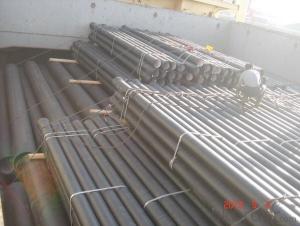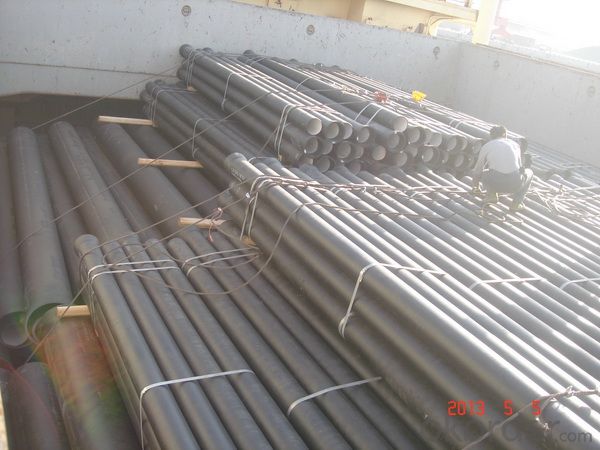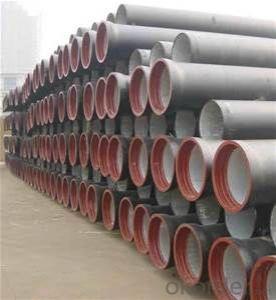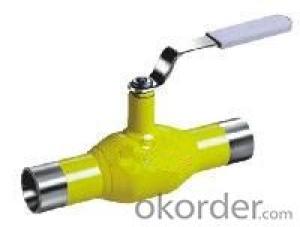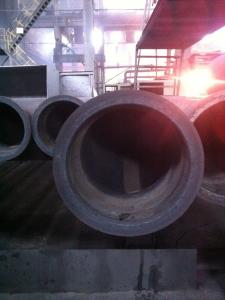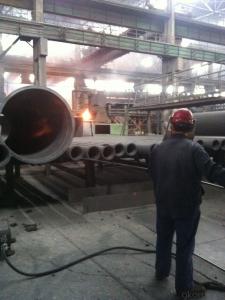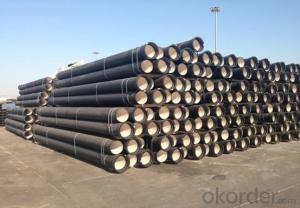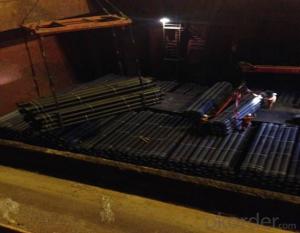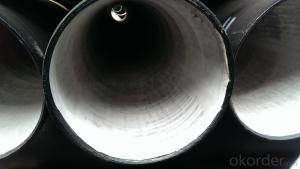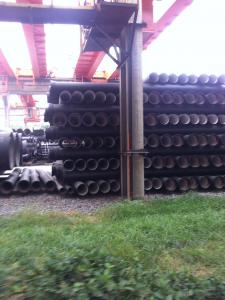DUCTILE IRON PIPES AND PIPE FITTINGS K9 CLASS DN1800
- Loading Port:
- Tianjin
- Payment Terms:
- TT OR LC
- Min Order Qty:
- 22 pc
- Supply Capability:
- 3000 pc/month
OKorder Service Pledge
OKorder Financial Service
You Might Also Like
Material : Ductile Cast Iron
Size Range : DN 80mm to DN 2000mm
Unit Effective Length : 6m or 5.7m
Manufacture Standard: ISO 2531:1998/ EN 545:2006/EN 598:2007
Annual capacity : 200,000 tons
Coating Exterior: Zinc 130g/m2 according to ISO 8179-1 and bitumen coating 70 microns.
Cement Interior: Portland Cement/ High Alumina Cement/ Sulphate Resisting Cement Lining according to ISO 4179
Special requirements on external coating and internal lining can be applied
We also provide accessories such as SBR/EPDM rubber gaskets, lubricant paste, pipe caps, PE sleeves, etc.
Additional Parts:
Each pipe is strictly inspected according to related standard to ensure permanently high performance.
Easy Installation at site and service free for life
Long Service Lifespan
Quotation will arrive you within 24hours once we get your inquiry.
We guarantee offering you a competitive price.
A copy of original inspection reports of pipes will be offered after shipment.
Photos of loading process will be sent to the customer after shipment effect.
We will follow-up the delivery progress after shipment effect and update to the customer on weekly basis.
- Q: Is the cast iron pipe buried in need of antiseptic treatment? What kind of anticorrosive materials are used?
- It must be antiseptic. Usually hot asphalt brush painted two times, winding glass fiber cloth two road, cross construction.
- Q: How do ductile iron pipes handle soil movement?
- Ductile iron pipes have the ability to handle soil movement well due to their flexible nature. They can withstand stress and strain caused by ground settlement, thermal expansion, and contraction, without cracking or breaking. The high tensile strength and elasticity of ductile iron allow it to adapt to shifting soil conditions, making it a reliable choice for underground installations.
- Q: Do ductile iron pipes require additional protection against external factors?
- Yes, ductile iron pipes typically require additional protection against external factors such as corrosion and abrasion. This can be achieved through the application of protective coatings or linings, cathodic protection systems, and proper installation practices. These measures help extend the lifespan and ensure the durability of ductile iron pipes in various environments.
- Q: Can ductile iron pipes be used for underground parking lot drainage?
- Ductile iron pipes are indeed suitable for drainage in underground parking lots. This robust material is frequently utilized in underground piping systems due to its strength and durability. It exhibits exceptional resistance to corrosion, making it an ideal choice for situations where the pipes will come into contact with moisture and water. Furthermore, ductile iron pipes possess considerable tensile strength, enabling them to bear heavy loads and endure the pressure exerted by vehicles in a parking lot. Consequently, opting for ductile iron pipes for underground parking lot drainage ensures a dependable and enduring solution.
- Q: Which is better, ductile iron pipe and spray plastic pipe?
- Ductile iron pipe corrosion resistance, strength, it is said that the Ming Dynasty ordinary cast iron works now, and now has a new type of dedicated, can be used, construction becomes very convenient, ductile iron pipe has no effect on water quality. Plastic sprayed steel pipe is a new type of pipeline with higher price.
- Q: DN300 what's the price of the ductile iron pipe / the weight and the price of one meter?
- Graphite is exist in spherical form, usually graphite size is 6-7, casting spheroidization grade control requirements for 1-3 quality (spheroidization rate greater than 80%), so the mechanical properties of the material itself has been improved, has the essence of iron, steel performance.
- Q: Water supply pipe is ductile iron, then it's fittings and valves and other parts must be ductile iron?
- The pipe material does not determine the valve material, the valve is generally based on several pressure temperature rating, medium condition and velocity, the valve must play a role as valve material, such as wear resistance, corrosion resistance, and so on,
- Q: How is ductile iron pipe recycled?
- Ductile iron pipe is a highly durable and long-lasting material used in various infrastructure systems such as water and wastewater pipelines. When it reaches the end of its life cycle, ductile iron pipe can be recycled rather than disposed of in landfills. The process of recycling ductile iron pipe begins with its removal from the ground. Typically, a trench is dug to access the pipe, and it is cut into smaller, manageable sections using specialized equipment. These sections are then transported to a recycling facility. At the recycling facility, the ductile iron pipe is further processed to remove any contaminants. This involves removing any fittings or joints that may be attached to the pipe. Any non-iron materials, such as rubber gaskets or coatings, are also separated and discarded. Once the pipe has been cleaned and prepared, it is usually crushed or shredded into smaller pieces. This step increases the surface area of the material, making it easier to melt down in the next stage of the recycling process. The crushed or shredded ductile iron pipe is then melted in a furnace at high temperatures. This process, known as smelting, converts the solid iron into a liquid state. During smelting, impurities and any remaining non-iron materials rise to the surface and are skimmed off. After smelting, the molten iron is poured into molds to form new products. These molds can be used to produce a wide range of ductile iron products, including new pipes, fittings, valves, and manhole covers. The new products made from recycled ductile iron pipe have the same qualities and durability as those made from virgin materials. Recycling ductile iron pipe not only reduces the demand for new materials but also helps conserve energy and resources. The process requires less energy compared to producing iron from raw materials, which results in a lower carbon footprint. Additionally, recycling ductile iron pipe helps to reduce waste and promotes a circular economy by giving new life to an otherwise discarded material.
- Q: What are the different coatings available for ductile iron pipe?
- There are several different coatings available for ductile iron pipe, each offering unique benefits and protection for various applications. Some of the most commonly used coatings include: 1. Cement Mortar Lining: This coating involves applying a layer of cement mortar to the interior surface of the pipe. It provides excellent resistance against corrosion and abrasion, making it suitable for transporting water and sewage. 2. Bituminous Coating: Bituminous coatings consist of a layer of asphalt or coal tar pitch applied to the pipe surface. This coating offers good protection against corrosion and is often used for underground pipes in water and wastewater systems. 3. Fusion-Bonded Epoxy (FBE) Coating: FBE coatings are created by electrostatically applying a layer of epoxy powder to the pipe surface, followed by curing it at high temperatures. This coating provides exceptional resistance against corrosion and is commonly used in applications where the pipe is exposed to harsh environments or corrosive substances. 4. Polyurethane Coating: Polyurethane coatings offer excellent resistance against abrasion, impact, and corrosion. They are often used for pipes that are exposed to abrasive materials or require additional protection against external damage. 5. Zinc Coating: Zinc coatings, also known as galvanized coatings, involve applying a layer of zinc to the pipe's surface. This coating provides excellent protection against corrosion, making it suitable for pipes that are exposed to moisture and aggressive environments. 6. Polyethylene Encasement: Polyethylene encasement involves wrapping the pipe with a layer of polyethylene film or tape. This coating provides a physical barrier against corrosion and is commonly used in conjunction with other coatings for added protection. It is essential to consider the specific requirements of the application, such as the type of fluid being transported and the environmental conditions, to determine the most suitable coating for ductile iron pipes.
- Q: Are ductile iron pipes suitable for use in wastewater treatment plants?
- Yes, ductile iron pipes are suitable for use in wastewater treatment plants. Ductile iron has excellent corrosion resistance, high strength, and durability, making it ideal for handling the harsh and corrosive environment found in wastewater treatment plants. Additionally, ductile iron pipes have a long lifespan and can withstand the high-pressure demands of wastewater systems, making them a reliable choice for this application.
Send your message to us
DUCTILE IRON PIPES AND PIPE FITTINGS K9 CLASS DN1800
- Loading Port:
- Tianjin
- Payment Terms:
- TT OR LC
- Min Order Qty:
- 22 pc
- Supply Capability:
- 3000 pc/month
OKorder Service Pledge
OKorder Financial Service
Similar products
Hot products
Hot Searches
Related keywords
